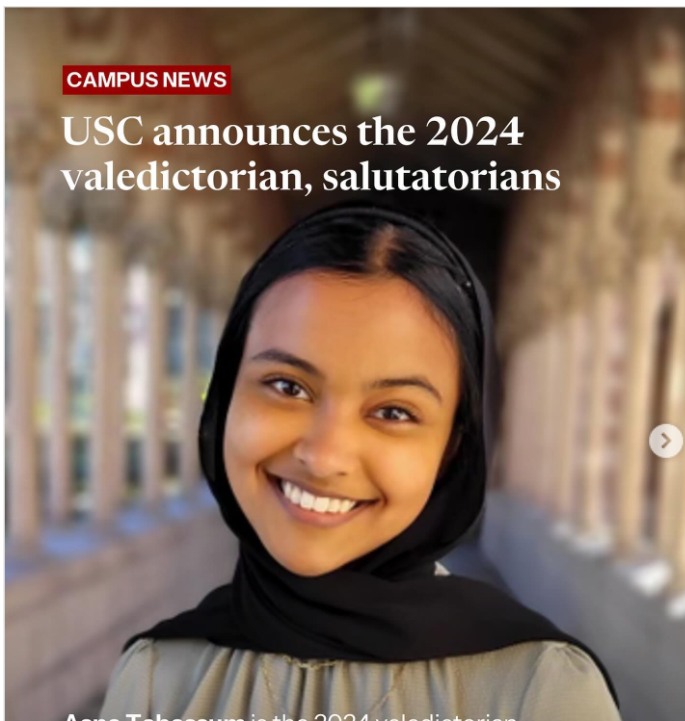The valedictorian’s speech at a college graduation is a firmly rooted part of the tradition, when young people who have worked hard for the four or more years that it took to get their degree, go out into the world and pursue their goals, whether those are to achieve financial gain or help humanity in some capacity.
But it’s a tradition that will not happen this year at the University of Southern California, as the school has canceled the pro-Palestinian valedictorian’s speech, citing fear of violence.
Typically, the student who has achieved the highest academic success within their graduating class is given this honor. To become the “chosen one” implies years of dedication and passion, usually a heavy involvement in extracurricular activities and leadership qualities. It’s an honor that carries with it the opportunity to address peers, offering a message of inspiration and an exhortation to get out there and do some good for yourself or for humanity. A valedictorian’s speech often touches upon shared experiences, highlights of the academic journey, and the challenges overcome together. Often, it endorses certain values. In short, in times of social conflict, the valedictorian’s speech is a ticking time bomb that may unleash strong passions and division.
From the start of the Israel Hamas war college campuses have been the battleground for violent protests and according to some, a breeding ground of religious bigotry. To express support for Palestinians has come to imply almost by default, that you’re antisemitic. The fierce division has led to the forced resignation of the presidents from Ivy League and other top institutions, the closing down of certain campus clubs, and the blackballing of students whose pro-Palestinian voices were deemed to be too loud or too angry.
The University of Southern California has made a pre-emptive move to prevent any disruption–or even violence–by canceling it, citing “substantial risks relating to security” over social media chatter surrounding the Israel-Hamas conflict.
Asna Tabassum, a fourth-year student from Chino Hills, California, was selected as the valedictorian and was to give a speech alongside two salutatorians. In a news release Monday, the university said she would no longer speak at the ceremony after the discussion about her selection took on “an alarming tenor.”
Reportedly, Tabassum’s social media includes an Instagram bio that links to a pro-Palestine website. This was enough to lead some students, alumni and others to complain to the university about her views.
“The intensity of feelings, fueled by both social media and the ongoing conflict in the Middle East, has grown to include many voices outside of USC and has escalated to the point of creating substantial risks relating to security and disruption at commencement,” Provost Andrew Guzman said in a statement.
Guzman referenced the violent protests that have led to harassment and violence at other campuses. He added that the school’s Department of Public Safety and campus safety team have consulted to evaluate potential threats for graduation, which typically draws around 65,000 people.
“This decision is not only necessary to maintain the safety of our campus and students, but is consistent with the fundamental legal obligation – including the expectations of federal regulators – that universities act to protect students and keep our campus community safe,” he added.
Asna Tabassum replied to the university’s decision in a statement released through the Council on American-Islamic Relations-Los Angeles.
“Although this should have been a time of celebration for my family, friends, professors, and classmates, anti-Muslim and anti-Palestinian voices have subjected me to a campaign of racist hatred because of my uncompromising belief in human rights for all,” Tabassum said.
CAIR said the school’s decision empowers voices of hate, violates its obligation to project students and “sends a terrible message to not only Muslim students at USC but all students who dare to express support for Palestinian humanity.” CAIR is also urging the community to demand the school to allow Tassabum to speak at graduation.
College campuses were once seen as the crucible for free speech and the celebration of diversity, but in an increasingly polarized social and political climate, that may be only a memory of the past.











